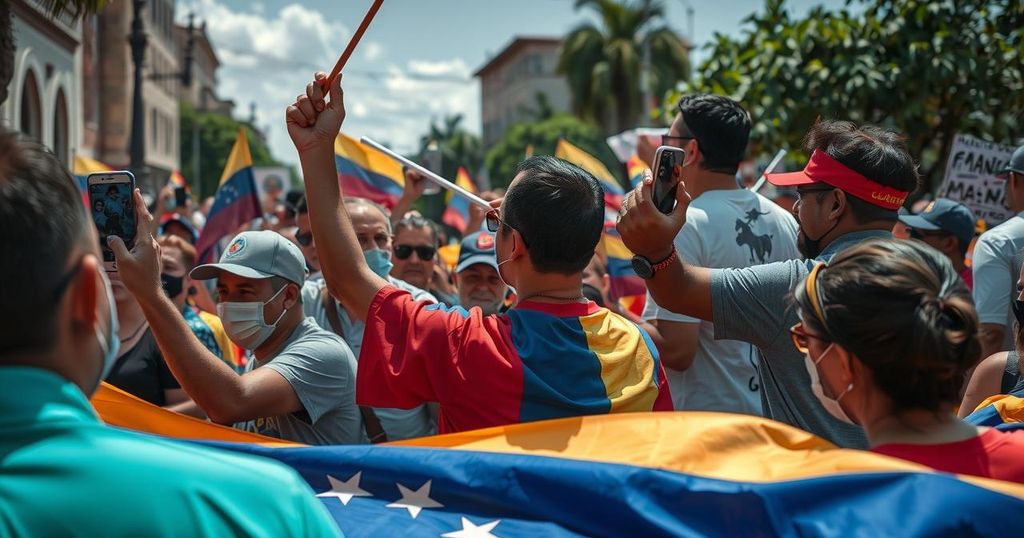Venezuela has reported the release of 177 imprisoned election protesters, raising the total to 910 since July’s disputed elections. Amid significant unrest following President Nicolas Maduro’s controversial win, rights groups express doubts about the announced figures, citing ongoing incarceration of many and reports of deaths in custody. The recent releases come as the international community closely monitors the situation, particularly in context of U.S. policy changes with the upcoming administration.
The Venezuelan government has announced the release of an additional 177 election protesters, contributing to a total of 910 individuals freed since unrest erupted following the disputed electoral vote on July 28. The Attorney General, Tarek Saab, confirmed this latest development on Monday. Rights organizations have raised concerns regarding the validity of these claims, noting the difficulties in corroborating the release of all purportedly freed prisoners. Furthermore, there have been reports of three deaths of protesters while in custody amid widespread demonstrations against the government’s alleged electoral fraud. Despite a significant number of detained individuals, as of early December, the Venezuelan rights group Foro Penal reported a staggering 1,877 political prisoners still remain incarcerated.
In a context marked by controversy, President Nicolas Maduro’s administration has faced immense scrutiny for its conduct during the elections, characterized by allegations of intimidation and violence. Prior to the election, opinion polls indicated that Maduro trailed significantly behind opposition leader Edmundo Gonzalez. However, the Venezuelan electoral council subsequently proclaimed a victory for Maduro, leading to protests that resulted in violent clashes with security forces, where at least 28 individuals lost their lives and around 200 sustained injuries. The Supreme Court’s endorsement of Maduro’s election win has been challenged by opposition leaders who argue that both the electoral council and judiciary are under the influence of Maduro’s loyalists.
As calls for transparency and justice intensify, there are indications that the recent releases might be influenced by external pressures, particularly in light of an ongoing investigation by the International Criminal Court (ICC) regarding the government’s response to post-election protests. The timing of these releases coincides with President Maduro’s upcoming inauguration for a third term on January 10, and with the anticipated change in United States foreign policy following the inauguration of President-elect Donald Trump. Trump’s administration previously imposed stringent sanctions on Venezuela but might adopt a more calculated approach moving forward. Given the ongoing detention of several U.S. citizens in Venezuela, analysts speculate that the government’s recent releases could be an attempt to cultivate better relations with the forthcoming U.S. administration.
The situation in Venezuela remains deeply complex and fraught with tension, as the political landscape continues to evolve amidst heightened scrutiny from domestic and international observers. The ongoing discussion concerning the legitimacy of electoral processes and the humane treatment of political prisoners will play a critical role in shaping future relations between Venezuela and the international community.
Venezuela has been a focal point of political turmoil, particularly following the controversial July 28 electoral vote in which President Nicolas Maduro declared victory despite significant opposition and claims of electoral fraud. The government’s response to post-election protests led to the arrest of approximately 2,000 demonstrators, raising serious concerns regarding human rights violations and the treatment of political dissenters. Rights organizations have documented numerous incidents of violence and have reported deaths of protesters in custody, further complicating the narrative surrounding the elections and the legitimacy of Maduro’s government. The situation has attracted the attention of the International Criminal Court, which is investigating the potential crimes committed during this period of unrest, while broader geopolitical implications are at stake with changing U.S. administrations.
In conclusion, the recent release of election protesters in Venezuela signals both a possible attempt by the Maduro government to manage domestic unrest and respond to international scrutiny. The high number of political prisoners and the ongoing investigations into human rights violations underscore the critical implications of the political climate in Venezuela. The global community will continue to observe the developments closely, particularly as power dynamics shift with the incoming U.S. administration. Ultimately, the legitimacy of electoral processes and the government’s commitment to justice and transparency remain pivotal issues at the forefront of Venezuela’s future.
Original Source: www.aljazeera.com






